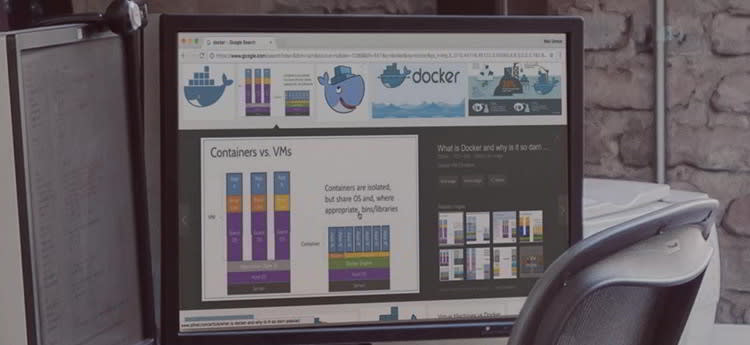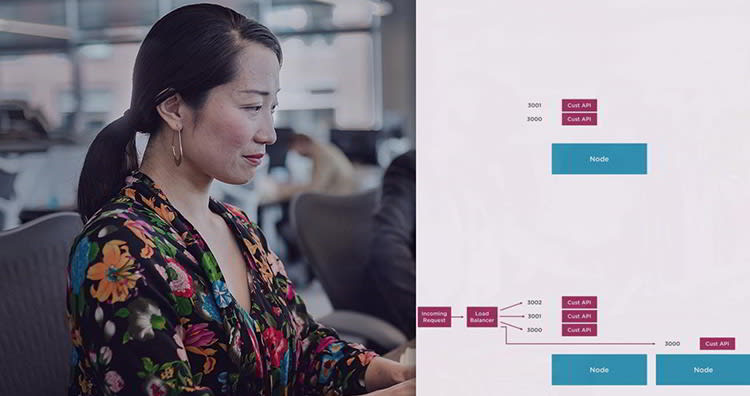If you're a developer, you're going to need to know how containers work. It's inevitable.
Docker is easy to understand, and quite nice to work with. But you need to have some good foundational knowledge about how they work.
Here are nine great courses to help you become a Docker Pro.
Beginner Level
1. Docker: Getting Started

This is a good spot to start if you're just getting started with Docker. If you've never used Docker before, take this course to hit the ground running.
You'll learn:
- How to install Docker in Windows, Mac, and Linux.
- How to manage containers and images
- Learn about Swarm mode, services, and much more.
You'll be up and running with a solid understanding of Docker. So if you're brand new to Docker, it's the place to start.
>> Click here to start this course
2. Getting Started with Docker on Windows

So if you want to get started with Docker on a Windows machine, you're in luck. Docker in Windows hasn't always been a smooth ride, but things have changed quite a bit. This course addresses running Docker as if it were at home on a Linux Machine.
You'll learn:
- How to use containers in Windows environments (both Windows and Linux Containers).
- How containers simplify finding, downloading, and installing software.
- How to build your own images and use docker-compose to orchestrate complex applications.
This is a great way to get up running with Docker, even if you're on a Windows system.
>> Click here to start this course
3. Getting Started with Docker Swarm Mode

Docker on a single node is fine for development, and some applications. But in production environments, you want to add capacity and reliability to your infrastructure, and Docker Swarm Mode provides that.
You'll learn:
- How to set up a swarm, add nodes, and launch services
- How to route traffic to clusters
- How to roll out updates and deploy application stacks.
This course will put you well on your way to deploy your swarm in no time!
>> Click here to start this course
Intermediate Level
4. Docker Networking

In this course, Docker Networking, you will learn everything you need to know about deploying and managing Docker networks.
You'll learn:
- Learn about the Container Network Model (CNM) and Libnetwork
- How to build and manage single-host and multi-host networks
- How to integrate container networks with VLANs and application networks.
This course will get you up and running with networks in no time!
>> Click here to start this course
5. Docker Deep Dive

In this course, you'll go from zero-to-Docker by learning everything you need to know to take your career to the next level and give you the confidence to start working with containers.
You'll learn:
- Learn about the foundational technologies powering containers on Linux and Windows
- Discover the core concepts of images and containers
- Understand orchestration and learn about enterprise features
This course will help you get a deep understanding of Docker and even prepare for the Docker Certified Associate exam!!
>> Click here to start this course
Advanced Level
6. Containerizing a Software Application with Docker

With the advent of the microservices architecture pattern and enabling technologies such as containers, the way applications are being architected and delivered is changing. Packaging software applications into read-only template images to derive immutable application containers is a key ingredient in this approach, and Docker is at the forefront.
You'll learn:
- How to create docker images, and their relationships with containers
- How to build Docker images for real software applications.
- How to name and share Docker images with a wider audience
By the end of this course, you'll know the techniques and best practices to get started with containerizing your software applications.
>> Click here to start this course
7. Monitoring Containerized Application Health with Docker
It's easy to run new and old applications in Docker, but you can't put containerized apps into production without monitoring. In this course, you'll learn how to implement effective monitoring for Linux and Windows containers.
You'll learn:
- How to gather and visualize metrics from containers using Prometheus and Grafana
- How to add metrics to your application, and export metrics from the Java and .NET runtimes and from the Docker platform.
- How to build an effective dashboard with a single view over the health of your whole application
When you finish this course, you'll be ready to add monitoring to your application and move confidently to production.
>> Click here to start this course
Conclusion
So whether you're a beginner looking to ramp up, or a seasoned pro looking to sharpen your skills you can use these courses to build your skills and become the "go to" Docker person in your organization.
So check it out, and let me know in the comments what you think!.




Top comments (0)